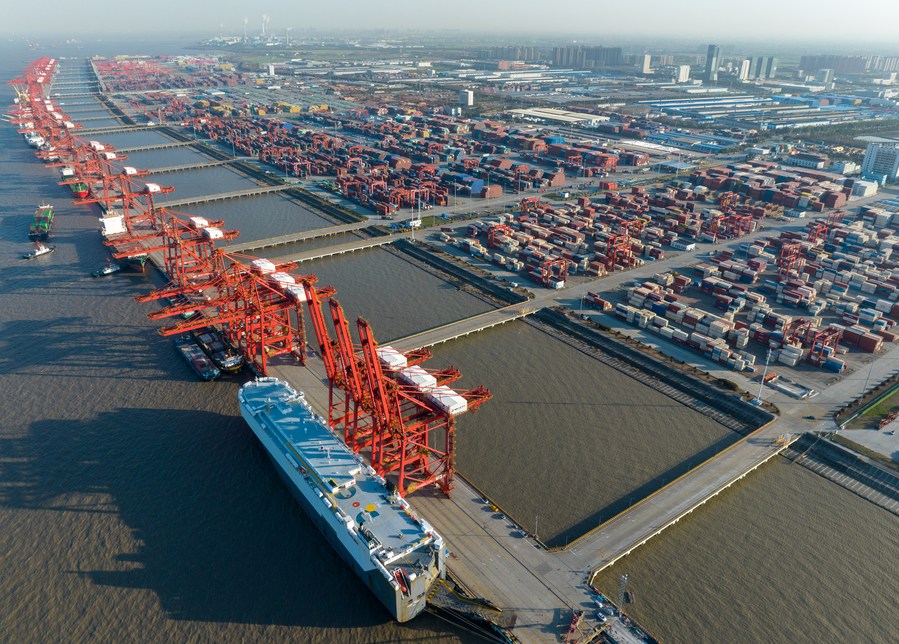Foreign trade to receive further tech, policy backing
 0 Comment(s)
0 Comment(s) Print
Print E-mail China Daily, March 23, 2023
E-mail China Daily, March 23, 2023

This aerial photo taken on March 13, 2023 shows a container terminal of Taicang Port, east China's Jiangsu Province. [Photo/Xinhua]
China's efforts to build modern industries and expand institutional opening-up will create new advantages in international cooperation and competition, especially given the challenges of slowing global demand, geoeconomic shocks and soaring global commodity and energy prices, said government officials and business leaders.
They said these efforts will not only enhance China's overall economic prowess, but also motivate its exporters to streamline their product structures and capitalize on novel foreign trade formats such as cross-border e-commerce and market procurement trade, therefore expanding their sales in overseas markets.
According to the Government Work Report submitted to the 14th National People's Congress for deliberation in early March, China will accelerate the modernization of its industrial system, with a focus on key industrial chains in the manufacturing sector and pooling quality resources. The country will make concerted efforts to achieve breakthroughs in core technologies in key fields.
China's export-oriented companies, particularly private businesses, have ample opportunities to transition from traditional industries to high value-added ones, relying on industrial upgrading and transformation, digital economy and cutting-edge technology, said Gu Xueming, president of the Chinese Academy of International Trade and Economic Cooperation in Beijing.
The government report also revealed that China has doubled its spending on basic research over the past five years, with scientific and technological progress contributing to over 60 percent of its economic growth.
Li Kuiwen, head of the Guangdong Office of the General Administration of Customs, emphasized the importance of enhancing efforts to expand high-level opening-up to create a more favorable environment for trade and investment.
Customs authorities in Guangdong province, one of China's key export hubs, will implement supportive measures to promote high-quality development of new business forms such as cross-border e-commerce, while actively upgrading services at ports, he said.
Li noted that 21 cities in Guangdong province have been approved as cross-border e-commerce comprehensive pilot zones, indicating strong commitment of local governments to boosting exports.
Similar views were shared by Bai Chongen, dean of Tsinghua University's School of Economics and Management.
"Advancing institutional-based opening-up at a high standard is beneficial for Chinese exporters to shore up overseas sales while optimizing and improving their product offerings," Bai said.
Luo Junjie, executive vice-president of the China Machinery Industry Federation in Beijing, predicts that China will experience stable growth in the machinery industry this year, particularly in areas such as new energy vehicles, electrical appliances, petrochemical equipment and construction machinery, driven by growing overseas demand.
In addition to supplying CR450 trains and light rail trains to domestic clients across China, CRRC Changchun Railway Vehicles Co Ltd, a Jilin province-based subsidiary of State-owned CRRC Corp Ltd, plans to enter more emerging markets and signatory economies of the Regional Comprehensive Economic Partnership agreement, as the pact has enabled trade among signatory economies to grow strongly since January last year.
"We will showcase cutting-edge products such as a new generation of unmanned subway trains, low-floor light rail trains and locomotives using a combination of hydrogen fuel cell systems and high-power lithium batteries in Brazil later this year," said Jiang Baiyang, the company's chief designer.
Compared with traditional fuel and electric locomotives, hydrogen-fueled hybrid locomotives are not only safer and more environmentally friendly, but also quieter, cheaper and easier to maintain, he said.
Despite lingering high inflation and weakening economic and trade growth globally, China's foreign trade in goods edged down just 0.8 percent year-on-year to 6.18 trillion yuan ($898.7 billion) in the first two months of this year, Customs statistics showed.
Confronting challenges of multiple factors like high inflation rates in developed economies and last year's high base of exports, China has pledged to adopt a package of steps to stabilize foreign trade, including helping exporters win orders and maintain production, accelerating the growth of new forms and models of foreign trade and giving full play to support the establishment of a number of overseas warehouses, according to information released by the GAC.
The government has also vowed to explore new ways to develop trade in services and digital trade.






Go to Forum >>0 Comment(s)